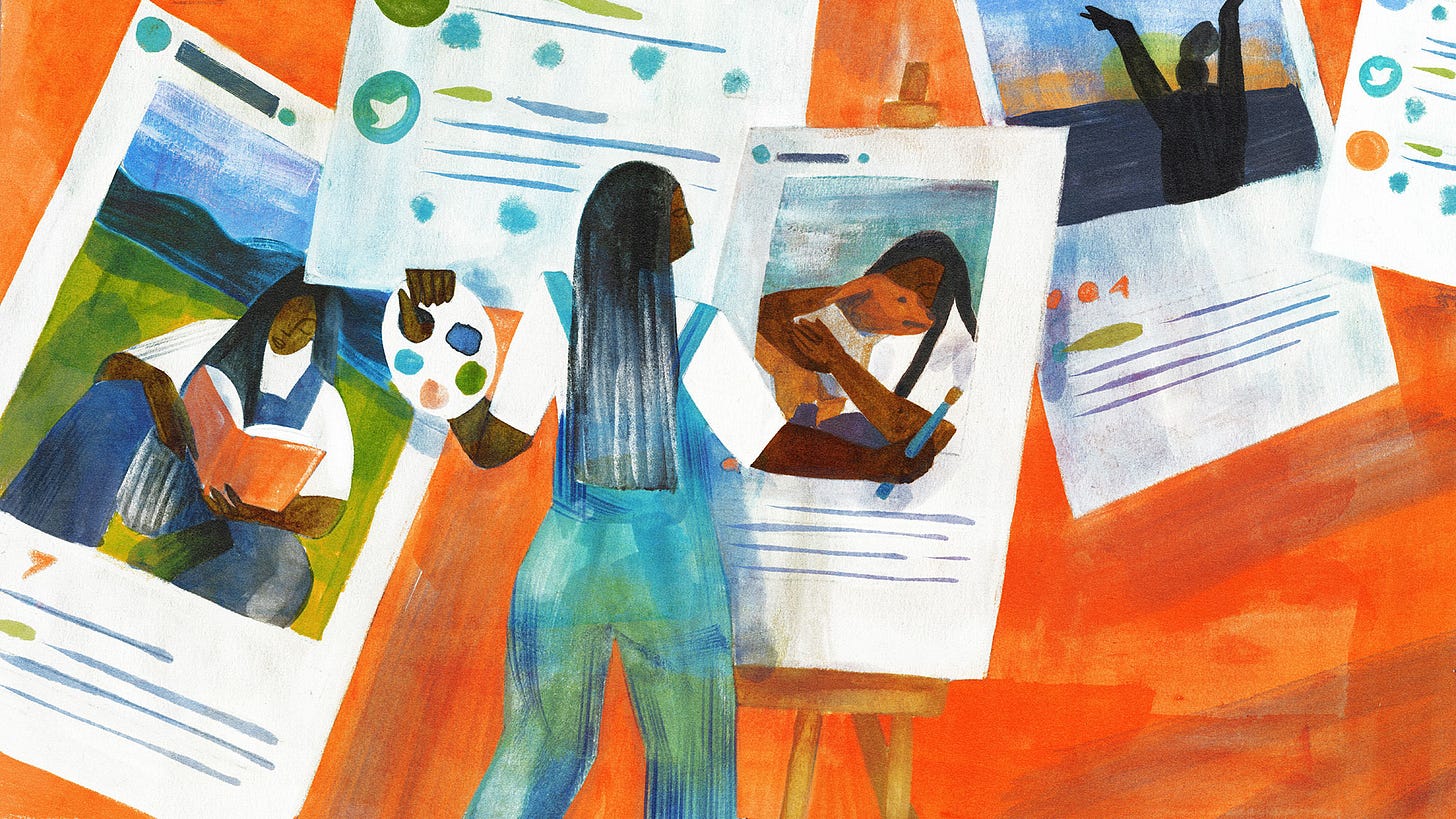Ten Personal Essays To Start Your Week Off Right...
Welcome to Memoir Monday—a weekly newsletter and a quarterly reading series, brought to you by Narratively, The Rumpus, Catapult, Granta, Guernica, Oldster Magazine, Literary Hub — and now many additional publications.
In addition to the weekly curation, there are now occasional original personal essays under the heading of First Person Singular, for paying subscribers. If you haven’t become a paid subscriber, please consider becoming one.
The second original essay, published in First Person Singular in April, is The Burden of Leaving, by emerging Nigerian writer Ahmad Adedimeji Amobi, in which he makes sense of what his leaving home means to his widowed mother.
Submissions are open. You can find submissions guidelines and more on the “About” page. Subscribe and follow us on Twitter at @memoirmonday for updates!
Essays from partner publications…
TLDR; I Tweeted Myself Into a Career and Now I'm Stuck Online
by Leah Johnson
“Most writers don’t have the luxury of relying on a team of powerhouse publicists or multimillion-dollar marketing budgets for our books. We are our own marketing machines. Social media sometimes feels like the closest thing to an equalizer we have—the vehicle for us to reach the widest audience for the least amount of money. It’s a job, to be sure. One that comes with very little in the way of tangible returns but can feel as urgent as the work that results in a steady paycheck every few weeks.”
Waypoint Transition
by Jo Unruh
"I am unable to resist the temptation of an opportunity to work for the government again, in service to my country. I am brainwashed to think it is the only secure thing for me, for my family. Have to earn that pension. I was halfway there and some, but who I am got in the way. Maybe I could have it all. The pension and my identity.”

In Pursuit of Chicken Rice
by Theodore Ross
"If cooking this food could be interpreted as ‘consuming’ and ‘parading,’ what could be made of my Asian wife and mixed-race kids? What awful motivations lurked beneath my love for them? The country was in tumult, careening toward change. I did not want to be left behind, even at dinner."
My Mother Photographs Me in a Bath of Dead Squid
by Lars Horn
“My mother always wanted me to look dead. Even when a car slammed my body against concrete, skull ricocheting off the kerbstone. When I woke to paramedics – blood loss, suspected spinal, head blocks. When the ambulance doors swung open as we took a roundabout, a paramedic grasping the stretcher, equipment hurtling out the back. As I was rushed into the emergency ward, my mother photographed me strapped to the spinal board, blood matting my hair, drenching my once-white Le Coq windbreaker. ‘No, don’t wake up, look dead, Lars, look more dead.’”
Yoko Tawada Captures the Unique Joys of Having an Uncategorizable Identity
by Yurina Yoshikawa
“I still remember the day when my brain switched from thinking in Japanese to English. I was in fifth grade, in my third year of being in a public elementary school in Palo Alto after having grown up in Tokyo. I was having a fight with my Japanese mother about something probably trivial, and while I understood what she was yelling at me in Japanese, I felt utterly frozen when I tried to respond in her language. Instead, I blurted out my emotions in fluent English, lush with 90s Californian lingo (“Oh my god, Mom, you just don’t get it”). We continued our back-and-forth, understanding enough of each other while almost gloating in our language of choice.”
Owning My Worth
by Jessica Handler
“Back when I was a production manager at a television network, I taped a cute little postcard over my desk. The slogan was obscured by swirls and color, but it read, ‘Tired of Being the Good Girl.’ I would eye that thing every time I had to confront a producer on the verge of missing a deadline, or coax a celebrity out of a tantrum. The message on the postcard reminded me of something I was afraid to acknowledge: I am worth more than this.”
Essays from around the web…
What Happens When a Childhood Is Interrupted by Genocide?
by Julie Brill
“The Hotel Moskva was the place to see and be seen in 1938, when my father was born blocks from here. Before the war he lived in nearby Dorcol, the Jewish neighborhood…During the Nazi occupation, the Gestapo chose our hotel for their headquarters. I haven’t decided if it’s a sign of disrespect to that past, or a mark of triumph that we’re staying here now.”
In the Blood
By Diana Cejas
“The honeybees that live in the walls of our house never did seem to like my sister. When she was six, one flew into her right ear and left its stinger there. She’s been half afraid of them, half resentful ever since. It’s the smell, my Mama says. Some molecule, some pheromone stuck down in her skin that irritates them. Makes them think that she’s a threat. The hive has been here, in the walls, in the ceiling, between the floors of our worn-out house since long before I, before Mama, before Pa, before his Papa lived here.”
Mosquito
by Genia Blum
"DDT was later banned, but it’s still used in countries where malaria is endemic—like the Dominican Republic, where a prehistoric mosquito carrying a malarial parasite was found preserved in a lump of ancient amber. The insect’s oldest forbear, however, was discovered just north of Winnipeg, trapped in the fossilized resin of an extinct tree species from the days when dinosaurs still roamed the earth. Other specimens have turned up in amber washed ashore on the coast of the Baltic Sea, gemstones so cherished by my Ukrainian parents that, on my sixteenth birthday—a milestone when school friends received keys to their own cars—I was presented with a waist-long, glossy necklace imported from what was then communist Poland."
The Half-Life of M&Ms
by Judy Bolton-Fasman
“I remember the commercials in which the Mars company promised M&M’s would only melt in your mouth, not in your hand. Like the grown-ups around me, the company lied to me too; the ones dipped in Red Dye No. 2 stained my palms like stigmata. The range of other M&M’s colors lit up the danger and pleasure centers in my brain. Looking back, I imagined my brain was a switchboard all aglow—the old-fashioned plug-in kind with lines frenetically snaking out of it.”
🚨Announcements:
Through June 27th, you can apply for Narratively’s Spring 2022 Memoir Prize.
“Narratively is accepting entries for our Spring 2022 Memoir Prize. We’re on the hunt for revealing and emotional first-person nonfiction narratives from unique and overlooked points of view — the best of which we’ll reward with four-figure cash prizes, publication and heavy promotion, and a lot more.”
Judges include:
Ashley C. Ford, New York Times–bestselling memoirist of Somebody’s Daughter
Nicole Rocklin, Oscar-winning film and TV producer behind the movie Spotlight
Glynn Washington, host, creator and executive producer of the podcast/radio show Snap Judgment
📢 Attention Publications and writers interested in having published essays considered for inclusion in our weekly curation:
By Thursday of each week, please send to memoirmonday@gmail.com:
The title of the essay and a link to it.
The name of the author, and the author’s Twitter handle.
A paragraph or a few lines from the piece that will most entice readers.
Because of data limits for many email platforms, going forward we will only include artwork from our partner publications. No need to send art.
*Please be advised, however, that we cannot accept all submissions, nor respond to the overwhelming number of emails received. Also, please note that we don’t accept author submissions from our partner publications.
You can also support Memoir Monday—and indie bookstores!—by browsing this Bookshop.org list of every book that’s been featured at the Memoir Monday reading series. It’s a great place to find some new titles to add to your TBR list!
If you received this email from a friend or found it on social media, sign up below to get Memoir Monday in your inbox every week!










